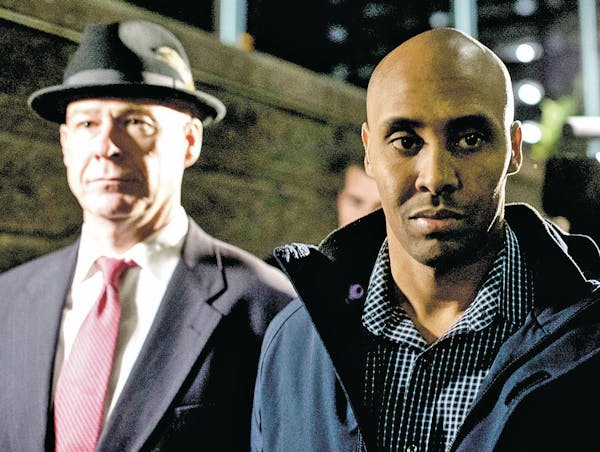Mohamed Noor, the fired Minneapolis police officer charged in the shooting death last summer of Justine Ruszczyk Damond, made his second court appearance Tuesday morning without entering a plea.
Noor, 32, of New Hope, faces charges of third-degree murder and second-degree manslaughter for shooting Damond from inside his police SUV after she had called 911 to report a possible rape near her South Side home last July.
Noor is the first Minnesota officer in recent memory to be charged with murder in connection with an on-duty death. The case, which has attracted international media attention and led to the ouster of the city's former police chief, remains in its early stages.
Assistant Hennepin County Attorney Amy Sweasy told the court Tuesday that the discovery process, during which both sides share documents and information that they may present at trial, is "largely complete." She added that no plea negotiations have taken place.
Noor's St. Paul-based attorney Thomas Plunkett asked District Judge Kathryn Quaintance for a meeting with prosecutors to discuss scheduling matters and establish a timeline of future hearings. In a filing last month, Plunkett indicated that his client intends to plead not guilty to both charges, arguing that the former officer was acting in self-defense and used "reasonable force" when he shot Damond.
That plea was expected to come Tuesday at what is known as an omnibus hearing, but Noor remained silent throughout his two-minute appearance.
Noor's father sat in the front row of the cramped courtroom, as his the ex-officer walked in — dressed in a dark-blue suit with a pale blue shirt and yellow and blue striped tie — accompanied by his lawyers, Plunkett and Peter Wold.
His next court date has not been set.
Noor turned himself in to authorities and was charged on March 20 in the death of Damond, a spiritual healer from Sydney who had moved to Minnesota to be with her fiancé. Noor was fired from the department on the same day.
He made his initial court appearance last month and shortly afterward was released after posting $400,000 bail, while agreeing to certain conditions: that he turn over his passport, surrender his firearms and ammunition and refrain from contacting his former partner, Matthew Harrity, who was present the night of the shooting.
Harrity was among the dozens of Noor's former colleagues who were called before a grand jury investigating the case, but it's unclear whether he offered testimony.
The Police Department and Hennepin County Attorney's Office each declined to comment on the case Tuesday. It wasn't immediately clear whether an Internal Affairs investigation into the shooting had been completed.
Hennepin County Attorney Mike Freeman announced his decision to charge last month after the monthslong grand investigating, saying that the officer acted "recklessly" when he fired the shot into the dark that killed Damond after she called 911 to report a suspected rape.
The shot came as Noor and Harrity were preparing to leave the scene, after driving through the alley behind Damond's home and seeing no suspicious activity. It was then that they were apparently started startled by someone outside the police SUV, according to authorities.
Harrity, the driver, told investigators he feared for his life, and went as far as to take his gun from its holster before Noor fired his weapon out the driver's side window, striking Damond. Neither officer's body camera was on at the time.
The ensuing investigation was complicated by the lack of body camera footage and the fact that Noor has declined to speak with state investigators or a grand jury probing Damond's death.
Damond's death was the third controversial police shooting in the Twin Cities in recent years — events that led to calls for greater police oversight, improved community relations and better training for officers. Last year, a jury found ex-St. Anthony police officer Jeronimo Yanez not guilty in the fatal shooting of Philando Castile during a July 2016 traffic stop.
The Damond shooting sent a shock wave from Minneapolis all the way to Damond's native Australia, horrifying many people there as a grim example of aggressive U.S. police behavior. It has also taken on racial overtones, with even some fervent police critics saying that the case has been handled differently than past officer-involved shootings. Noor is black, and Damond was white.
Noor can petition a third-party arbitrator to get his job back, as other officers fired for on-the-job conduct have done. But that path got more difficult last month, after the state appeals court ruled in favor of the city of Richfield in its efforts to fire a police officer after a video of him slapping a teenager went viral online.
The decision was hailed as a major victory in the movement to overhaul the state's decades-old arbitration system that the Minnesota Chiefs of Police Association deemed "broken."

The Hamline Elite Meet, already in rare air, presents a co-ed look
Minneapolis to set up Lake Street Community Safety Center, and wants residents' help to define it
Searching for Snoopy: What happened to all the 'Peanuts' statues in St. Paul?
North Oaks withdraws request for density exemption from Met Council

